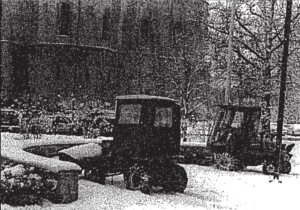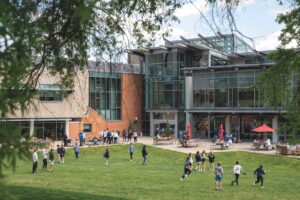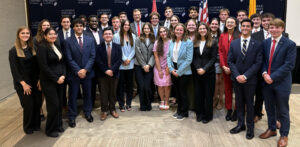Advice for Making the Most of Your Catholic U Experience

Image courtesy of College Consensus
By Trinity Ruiz and Chris Carey
Trinity:
As the academic pace at Catholic University begins to accelerate, it can become overwhelming to adapt to managing your classes and being around hundreds of people again. As a first-year student who spent the entirety of her senior year at a new school – in her bedroom – I was eager to return to classes and absorb all the opportunities CUA has to offer.
That is why Staff Writer Chris Carey and I collaborated to share our personal experiences during and following the limitations of the pandemic; we hope to illustrate our struggles and how we have found comfort in our community despite the challenges.
To avoid using euphemisms, I will say that my first week of classes was very rough, not because I was catching up on prerequisites or given loads of homework on the first day, but because I couldn’t find a purpose for doing it all. I love school and I always have, but I couldn’t seem to grasp the bigger picture.
Orientation and all the campus activities hosted were a blast, but then it was over. Now I had to focus on what I came here for: a degree. Then doubt sank in: What if I can’t do it? What if I don’t want it anymore? What if I am just going through the motions? It felt like while everyone was certain of their goals, I remained uncertain.
But as the week went on, there were events to look forward to. The Nats vs. The Mets game was upcoming, not to mention a whole city to explore. There were familiar faces to smile and say hello to in the morning. There was a community within this university that, after just a few weeks, I now call home.
Chris:
Looking back on nearly four years spent at Catholic University, there is both much learned and much to look forward to. Each student experiences the first day jitters, the general confusion over scheduling, and figuring out where Pryz 351 is. I know I did.
With all of the exciting opportunities and new ventures that college in Washington, D.C. affords, there also come difficulties stepping out of one’s comfort zone, homesickness, and the stresses of a university education.
Although I am certainly not the expert on any of these topics, I hope that in sharing my experiences in managing these difficulties, I might be able to shed some light on strategies that could work for at least some of the first and second-year students who have lost such precious time to the coronavirus pandemic over the past year and a half.
First, I want to let you know that your uncertainties and anxieties are much more common than you might think. College is a stressful, albeit extremely rewarding, time in our lives. We are given the chance to meet new people, and while exciting, this task can be daunting as well.
I learned pretty quickly that people respond best to the genuine person on the inside. People love people who love things, so be passionate, care about others. Get involved. There is far too little time at this school to waste it in your dorm room so get out there and explore. Check out events on campus, go into the city, enjoy what Washington has to offer.
Recognize the humanity in everyone around you and understand you are never alone in your journey through the college experience. Call home, whether that means a friend, a family member, or a teacher from high school.
It all boils down to sowing seeds and putting in little spurts of effort that will pay off in the long run. Like most things, college comes down to getting out what you put in; in 20 years, you will not remember the slight discomfort you felt from leaving your comfort zone, but you will regret the loss of opportunities you abandoned because of that feeling.
Trinity:
As it is now the third week, my perspective has made its way back. From Friday night events, to faith and service opportunities, there is so much to engage with at Catholic. Every weekday there is some sort of meeting happening in the Pryz. Attend one you have even the slightest interest in. You never know who you will meet or the future it might inspire.
I encourage new and returning students to become involved even if it risks stepping out of their comfort zone. The farther you stretch that zone, the more vast it will become; because now, all the people that I have come to know have become that comfort zone, and I can only hope that it continues to grow.







